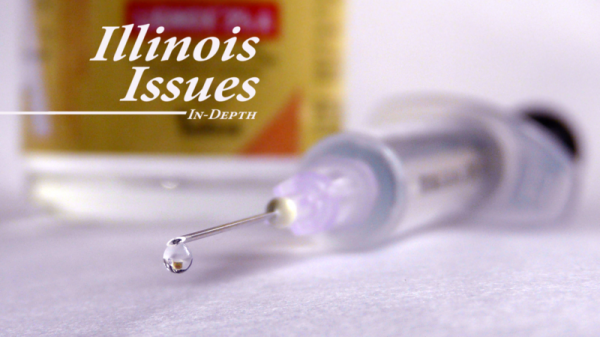Will Illinois Ban Religious Exemptions For Vaccines?

Dr. Partha Sarathi Sahana / via Flickr CC By 2.0
Kids across Illinois will be heading to school next month. For parents, that means checking off supply lists, calming those first day jitters, and even getting their kids vaccinated. Not everyone believes in that last one, which is why states like Illinois offer families exemptions for religious reasons.
But just last month, New York joined a handful of states that ban the practice, citing a large spike in measles cases. Though it hasn’t happened yet in Illinois, lawmakers across the country are mulling whether or not to do the same.
We explored whether Illinois should—or could—end religious exemptions for vaccines.
To understand why religious exemptions are a big deal in the public health realm, you have to understand what just happened in New York state. Hundreds of measles cases were popping up all over the place there. They seemed to be stemming from a few communities near New York City where families were refusing to vaccinate their kids for religious reasons.
It’s something a lot of states allow families to do, and parents of nearly 26,000 kids across New York did just that last school year.
The problem is, a lot of those kids were getting sick. It seemed like the New York state legislature should act, and what they ended up doing was to ban the practice of religious exemptions. New York Governor Andrew Cuomo signed a bill to do that in June.
“I understand freedom of religion. We all do, we respect it," he said. "I’ve heard the anti-vaxxer’s theory, but I believe both are overwhelmed by the public health risk.”
New York state Sen. Brad Hoylman sponsored that move. He was interviewed by a local TV station before it passed, telling them he wanted to close what he called a loophole in public health law.
“This loophole is being exploited by people who are being misled by anti-vaxxers," he said.
New York was just the latest state to do this. Maine joined the group earlier this year that includes California, Mississippi and West Virginia. Diane Peterson with the Immunization Action Coalition explained nearly all of them had a preventable disease outbreak.
“It [disease outbreaks] led many states to strengthen their process for getting a non-medical exemption" she said. "But what that has done in many instances is just push parents from, maybe, a personal exemption to the religious exemption.”
Peterson’s group works with the Centers for Disease Control to educate the public about vaccines. She explained people all over the country have been claiming religious exemptions after they’ve talked someone who opposes vaccinations, a so-called anti-vaxxer. They claim there are a lot of reasons not to get them.
“[They make] claims such as vaccines might cause autism, or too many harmful chemicals in the vaccines can lead to problems,” Peterson said
Both of those claims have been disproven; nonetheless, as states have gotten tougher on what exemptions to allow, a religious one is often a parent’s only option. Peterson explained that’s led to abuse in places like New York.
Now to the big question: where does Illinois find itself in all of this?
The state only allows religious exemptions to vaccines. Parents have to fill out a form, have their doctor sign it, and submit it to school administrators for approval.
Illinois passed a law approving that form in 2015. Some other states that have the form, like Nebraska, even require a religious leader to sign off.
Illinois Director of Public Health Ngozi Ezike told us it’s there for a reason.
“We just want to make sure people have understood what they may be refusing and maybe the risks of refusing, and the benefits of immunization," she said.
About 19,000 Illinois school kids used religious exemptions for vaccines last year, a 46 percent jump from years past. Meanwhile, nine people in the state have come down with measles so far this year. While not a large number, it’s the most since 2015.
To drive that number down, Ezike says her team is looking at “all the available options,” which might include doing away with the religious argument for opting out.
“We would look [for] anything we need to do in terms of legislation to help get as many kids vaccinated as possible," she said, hinting at the possibility.
Sometimes a child has to have a vaccine exemption. For example, they might be allergic or have a compromised immune system. Beyond that, Ezike explained, it comes down to personal preferences. “There’s specific medical conditions that would absolutely preclude a patient from receiving vaccinations," she said. "That’s completely different and distinct from the religious exemption.”
That leads to another question: should Illinois do that? Diane Peterson reasoned states should keep the option open.
“We need to come up with better immunization policy that does not allow children to have these other exemptions,” she said.
Barbara Loe Fisher is of a different mind. She runs the National Vaccine Information Center, which advocates for what it calls “informed consent.”
“We believe that people should be allowed to have all the information and make a voluntary decision without being punished for the decision they make," Fisher explained.
At least nine other states proposed getting rid of all non-medical exemptions last year. But so far, Illinois lawmakers have avoided making a change that some view as taking a choice away from parents. Few are interested in wading into a debate over freedom of religion.
But what the state is doing right now is more telling: the public health department got a $3 million funding boost for vaccine outreach, and the state is subsidizing vaccines for low income kids, something it had stopped doing.
For Illinois to go beyond, it might take the type of public health emergency that happened in New York.

